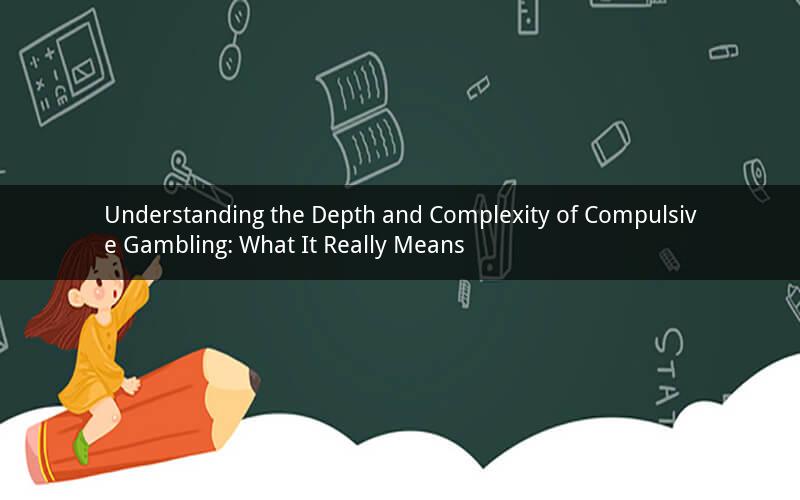
Introduction:
Compulsive gambling, also known as problem gambling, is a behavior that can lead to significant negative consequences for individuals and their families. However, what exactly does it mean to be a compulsive gambler? This article delves into the meaning of compulsive gambling, its causes, effects, and the path to recovery.
I. Definition of Compulsive Gambling
Compulsive gambling is characterized by an irresistible urge to gamble, despite the negative consequences it may have on one's life. It is a type of addiction that affects both the mind and behavior of the individual. While gambling can be a form of entertainment for many, for compulsive gamblers, it becomes an all-consuming obsession.
II. Causes of Compulsive Gambling
The causes of compulsive gambling can be multifaceted, encompassing various factors such as genetics, environmental influences, and psychological vulnerabilities. Some individuals may have a genetic predisposition to addiction, while others may be influenced by the availability of gambling opportunities or the societal normalization of gambling.
III. Effects of Compulsive Gambling
The effects of compulsive gambling can be profound, impacting various aspects of an individual's life. Financial problems, strained relationships, legal issues, and mental health challenges are just a few of the consequences that compulsive gamblers may face. Understanding these effects can help shed light on the seriousness of the problem.
IV. Identifying Compulsive Gambling
Recognizing the signs of compulsive gambling is crucial for those affected and their loved ones. Common symptoms include a preoccupation with gambling, spending more time and money on gambling activities, feeling restless or irritable when unable to gamble, and chasing losses. Identifying these signs can be the first step towards seeking help.
V. Treatment and Recovery
Treatment for compulsive gambling typically involves a combination of therapy, support groups, and lifestyle changes. Cognitive-behavioral therapy (CBT) is often recommended to address the underlying psychological issues associated with gambling addiction. Support groups, such as Gamblers Anonymous, provide a community of individuals facing similar challenges and offer encouragement and guidance.
VI. The Importance of Awareness and Support
Awareness about compulsive gambling is essential in order to address the issue effectively. By educating individuals about the risks and consequences of gambling addiction, we can promote a healthier approach to gambling. Additionally, offering support and resources to those affected can significantly improve their chances of recovery.
VII. The Role of Society
Society plays a vital role in addressing compulsive gambling. By creating policies that regulate gambling opportunities, promoting responsible gambling practices, and providing support services, we can create a safer and more informed gambling environment. This includes implementing measures to protect vulnerable individuals and preventing gambling-related harm.
Q1: How can someone determine if they or someone they know has a problem with compulsive gambling?
A1: Individuals can identify signs of compulsive gambling by observing changes in behavior, such as preoccupation with gambling, increased spending on gambling activities, and strained relationships. If these signs are present, it is essential to seek professional help.
Q2: What are some common reasons why people develop a compulsive gambling addiction?
A2: Compulsive gambling can be influenced by various factors, including genetic predisposition, environmental exposure to gambling, psychological vulnerabilities, and the pursuit of excitement or escape from stress.
Q3: Can compulsive gambling be treated, and what are the most effective treatment approaches?
A3: Yes, compulsive gambling can be treated. Cognitive-behavioral therapy (CBT), support groups, and lifestyle changes are some of the most effective treatment approaches. The key is to address the underlying psychological issues and provide individuals with the tools to overcome their addiction.
Q4: How can society contribute to the prevention of compulsive gambling?
A4: Society can contribute to the prevention of compulsive gambling by implementing regulations on gambling opportunities, promoting responsible gambling practices, providing education on the risks of gambling addiction, and offering support services to individuals affected by the problem.
Q5: Can someone recover from compulsive gambling, and what is the likelihood of long-term recovery?
A5: Yes, individuals can recover from compulsive gambling. With the right treatment, support, and dedication, many individuals have successfully overcome their addiction. The likelihood of long-term recovery is higher when individuals actively participate in treatment and maintain a strong support system.